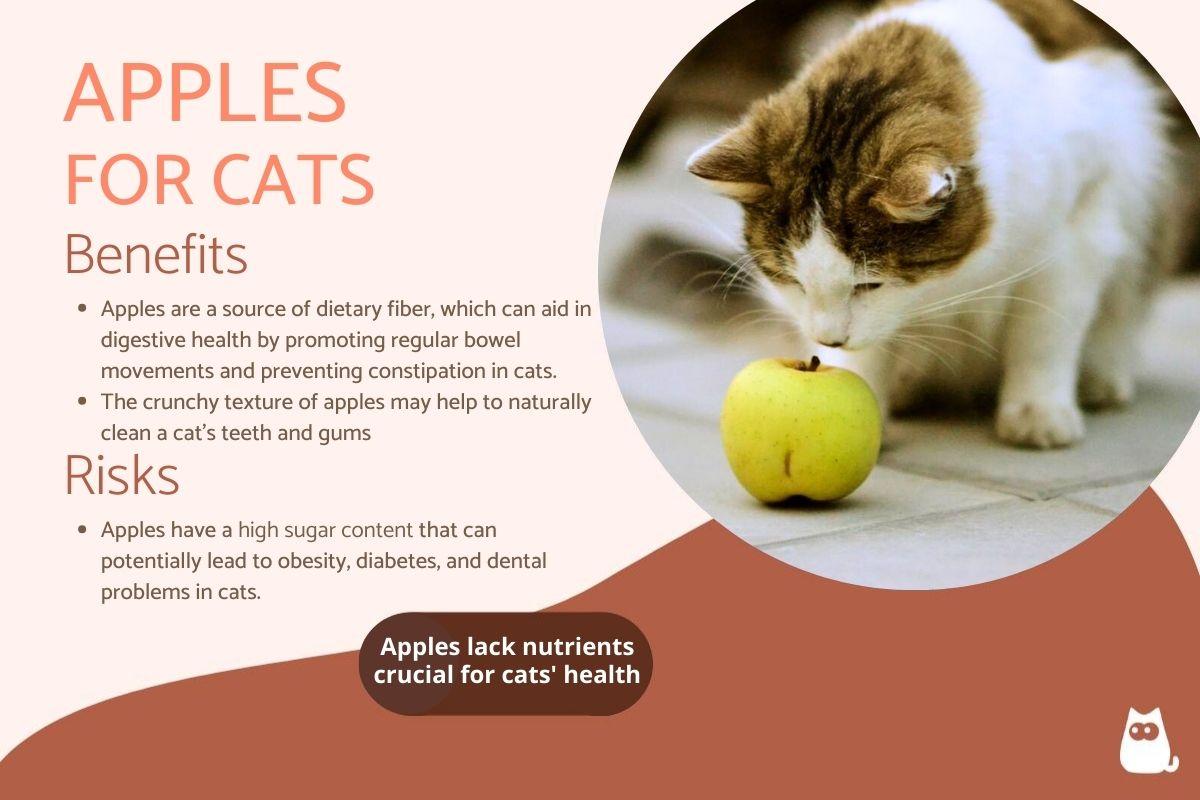Can Cats Eat Apples?



See files for Cats
Apples are one of the most popular fruits worldwide, known by their crisp texture, sweet flavor, and versatility in cooking and baking. Cats are notorious for their curious nature, sometimes leading them to explore unusual food options. One such curiosity might be apples, a popular and readily available fruit. Understanding the potential benefits and risks associated with feeding apples to your feline friend is crucial for ensuring their well-being.
The following AnimalWised article explores if apples are safe for cats, examining their potential benefits and any associated risks.
Are apples good for cats?
Apples offer numerous health benefits for humans, boasting a nutrient-rich profile containing fiber, vitamins, and antioxidants that contribute to heart health, digestive function, weight management, blood sugar control, and hydration. However, for cats, the situation varies considerably.
A cat's dietary needs differ significantly from humans. What might be a healthy snack for us could pose potential health risks for them. Therefore, it's essential to be informed about the safety of introducing any new food to your cat's diet, including apples.
While apples are not toxic to cats and can be consumed in small amounts without immediate harm, they lack essential nutrients that cats require for optimal health.
Cats are obligate carnivores, meaning their digestive systems are specifically designed to process nutrients from animal protein. While apples contain various vitamins and minerals, cats can't efficiently absorb most of them from plant-based sources like fruits. Their bodies are better equipped to obtain these nutrients from animal-based foods.
Apples are fruits lacking essential nutrients like taurine and L-carnitine, which are crucial for feline health. Additionally, their digestive systems struggle to efficiently absorb most vitamins and minerals from plant sources.
Therefore, while apples are not inherently harmful to cats, they are not considered a necessary or recommended part of their diet, and it's best to focus on providing them with species-appropriate food that meets their unique nutritional needs. For a deeper dive into feline nutrition, check out our other article on cat diets.
Apple benefits for cats
While apples are not a necessary part of a cat's diet, they can offer some potential benefits when given in moderation.
Apples are a source of dietary fiber, which can aid in digestive health by promoting regular bowel movements and preventing constipation in cats. The soluble and insoluble fiber in apples can aid in regulating intestinal transit by promoting peristalsis, which helps alleviate constipation. Additionally, the astringent properties of apples may assist in firming stools during episodes of diarrhea by reducing intestinal inflammation and excess water.
Additionally, the crunchy texture of apples may help to naturally clean a cat's teeth and gums, promoting oral hygiene.
Furthermore, apples provide a variety of nutrients, including vitamin C, B vitamins (B1, B2, B6), calcium, potassium, manganese, antioxidants, flavonoids, and polyphenols. Moreover, compounds like quercetin, found in apples, have been associated with potential health benefits such as reducing the risk of cardiovascular diseases, asthma, arthritis, and muscle problems. Additionally, malic and tartaric acids present in apples can aid in the digestion of fats.
However, it's crucial to remember that while apples can be beneficial, they should not replace a balanced and species-appropriate diet formulated specifically for cats.
Struggling with your cat's digestive health? Discover alternative dietary options in our follow-up article, offering a guide to managing feline digestive issues.

How to give an apple to a cat?
When introducing a new food to cats, it's important to proceed gradually to avoid any potential harm to their bodies. Therefore, if you're considering giving your cat an apple, it's best to start with a small piece and observe their response.
It's crucial to always remove the skin of the apple, as it can be difficult for cats to chew and may contain residues of chemicals used in apple tree agriculture that can be toxic for the cat.
Additionally, it's essential to remove the stem, seeds, and core of the apple to prevent any potential harm.
If your cat tends to be very gluttonous or doesn't chew their food thoroughly, it's advisable to cut the apple into small pieces to reduce the risk of choking or choking. Furthermore, crushing the apple can make its ingestion even easier for your cat.
You can also mix apple pieces with other foods that are also suitable for cats, such as meat or fish, if you're interested in creating a homemade diet. To achieve this, you can cook the food or follow the BARF diet, as we explain in the video below.

Side effects and contraindications of apples in cats
While apples are not inherently toxic to cats in very small quantities, there are several contraindications to consider when it comes to giving them apples. To begin with, apples are high in sugar, which can contribute to:
- Obesity: overweight or obese cats are at increased risk for various health problems, including diabetes, joint issues, and respiratory problems.
- Diabetes: regularly consuming high amounts of sugar can put cats at risk of developing diabetes, a chronic condition affecting their ability to regulate blood sugar levels.
- Dental problems: excessive sugar intake can contribute to the growth of harmful bacteria in the mouth, leading to dental issues like cavities, gum disease, and tooth loss.
Apple cores, seeds, and leaves contain small amounts of amygdalin, which breaks down into cyanide when ingested. While the amount present in these parts is generally considered too low to cause serious harm to humans, it can be toxic to cats, especially in larger quantities. Symptoms of cyanide poisoning in cats include:
- Difficulty breathing
- Dilated pupils
- Lethargy
- Seizures
- Vomiting
Therefore, due to the potential health risks and limited nutritional benefits, it is strongly advised to avoid giving apples to cats.
Consulting a veterinarian is crucial before introducing any new food to your cat's diet, and commercially prepared cat food formulated to meet their specific needs remains the best option for their overall health and well-being.
If you want to read similar articles to Can Cats Eat Apples?, we recommend you visit our Homemade diets category.
- JD Rode. Manual of veterinary toxicology . Available at: http://www.rednacionaldeveterinarias.com.uy/articulos/farmacologia%E2%80%8F/Manual_de_toxicolog_a_veterinaria.pdf






